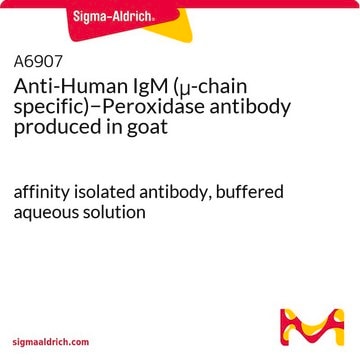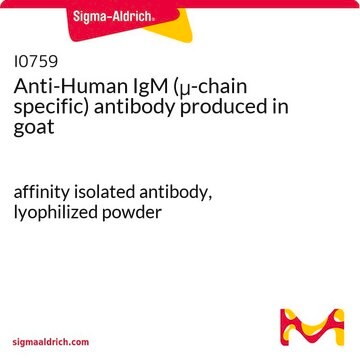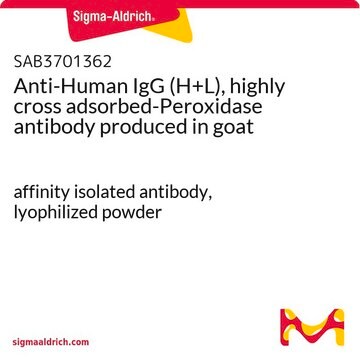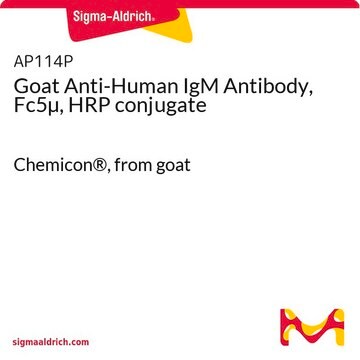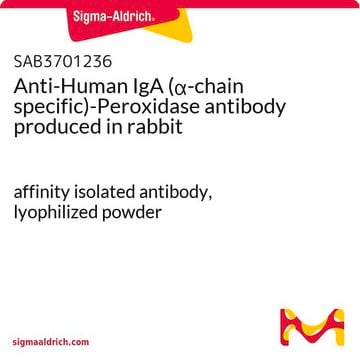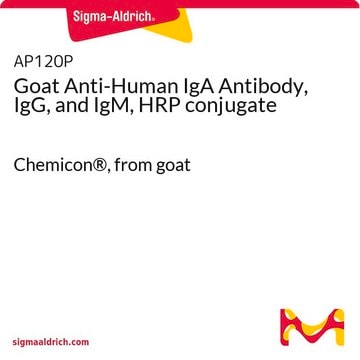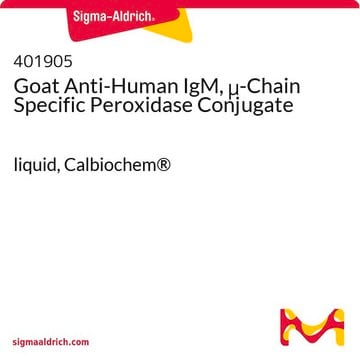A0420
Anti-Human IgM (μ-chain specific)−Peroxidase antibody produced in goat
affinity isolated antibody
Sinónimos:
Goat Anti-Human IgM (μ-chain specific)−HRP
About This Item
Productos recomendados
biological source
goat
Quality Level
conjugate
peroxidase conjugate
antibody form
affinity isolated antibody
antibody product type
secondary antibodies
clone
polyclonal
species reactivity
human
technique(s)
direct ELISA: 1:50,000
dot blot: 1:100,000 (chemiluminescent)
immunohistochemistry (formalin-fixed, paraffin-embedded sections): 1:200
shipped in
dry ice
storage temp.
−20°C
target post-translational modification
unmodified
¿Está buscando productos similares? Visita Guía de comparación de productos
General description
Goat anti-human IgM (mu-chain specific)-peroxidase antibody is specific for human IgM and does not bind to other human Igs. Furthermore, the antibody does not react with mouse and rat IgG. Hence, the antibody conjugate yields reduced background with mouse or rat samples.
Immunogen
Application
- for dot blot (1:100,000) and immunohistochemistry (1:200 using formalin-fixed, paraffin-embedded sections) applications.
- in immunoblotting
- sandwich immunoassay
Biochem/physiol Actions
Physical form
Preparation Note
Disclaimer
¿No encuentra el producto adecuado?
Pruebe nuestro Herramienta de selección de productos.
signalword
Warning
hcodes
Hazard Classifications
Skin Sens. 1
Storage Class
12 - Non Combustible Liquids
wgk_germany
WGK 2
flash_point_f
Not applicable
flash_point_c
Not applicable
ppe
Eyeshields, Gloves
Elija entre una de las versiones más recientes:
Certificados de análisis (COA)
¿No ve la versión correcta?
Si necesita una versión concreta, puede buscar un certificado específico por el número de lote.
¿Ya tiene este producto?
Encuentre la documentación para los productos que ha comprado recientemente en la Biblioteca de documentos.
Los clientes también vieron
Nuestro equipo de científicos tiene experiencia en todas las áreas de investigación: Ciencias de la vida, Ciencia de los materiales, Síntesis química, Cromatografía, Analítica y muchas otras.
Póngase en contacto con el Servicio técnico